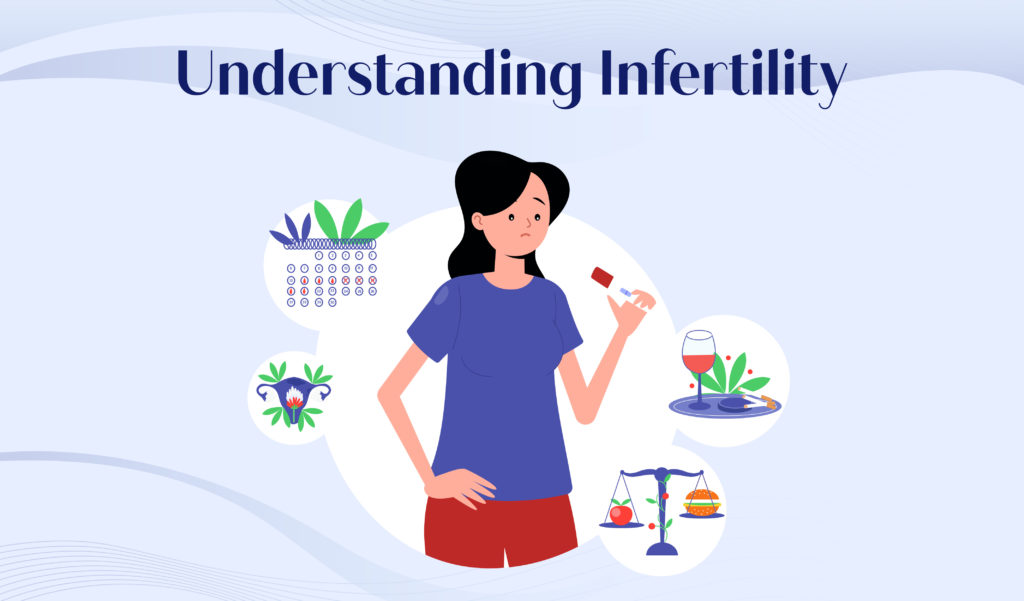- May 15, 2022
- By: Arias Hospital Nashik
Understanding Infertility
Many of us today are spending a major portion of our life on building a career and fulfilling our dreams. This accounts for late marriages, avoiding unplanned pregnancies, and the assumption that once we are ready to have a baby, it will just happen with a little difficulty. Switching gears from avoiding pregnancy to planning conception might seem smooth and easy, but it is not. Some can experience trouble starting a family- this situation is termed Infertility.
In this article, we will give you a better idea and help you gain an understanding of what infertility is, how to identify the signs of infertility, what are its causes, and when should you seek medical attention. So, let’s start with understanding the meaning of infertility.
What does Infertility really mean?
Infertility is the inability to conceive even after one year of frequent and unprotected sexual intercourse. It is a common problem of the reproductive system that affects both men and women and can have a traumatic and emotionally destructive effect on individuals.
In India, almost 10 to 14% of the total Indian population is affected by infertility according to the Indian Society of Assisted Reproduction. Fortunately, the causes of infertility can be identified and treated in most cases.
How can you identify the signs of infertility in your body?
There are early indicators of infertility that you can identify and take a charge of them to make a difference before it is too late. Let’s understand what are they:
Signs of infertility in Women
- As already mentioned, women trying to achieve pregnancy over the course of one year with no results should a doctor. Women over the age of 35 should seek assistance after a period of 6 months.
- An unpredictable or irregular menstrual cycle, when compared to a 28-day timeframe, is another indicator.
- Menstrual cramps that are more painful than normal are a potential sign of endometriosis which also contributes to infertility.
- Facial hair growth, skin irritations, change in sex drive, damaged hair follicles, or excessive weight gain also points out the problem with fertility.
- Hormonal fluctuations, pain during sexual intercourse, or other issues like PCOS or Fibroids also increases the odds of infertility.
Signs of infertility in Men
- Problems with sexual functions such as ejaculation, small volumes of fluid ejaculated, erectile dysfunction, or reduced sexual desire.
- Testicular pain, swelling, or lump in that area.
- Inability to smell and recurrent respiratory infections.
- Gynecomastia (abnormal breast growth)
- Hormonal or chromosomal abnormality
- Lower sperm count
What causes Infertility?
There are multiple factors that contribute to infertility in men and women. However, sometimes it is impossible to explain the cause of infertility.
In females infertility may cause by:
- Tubal disorders such as blocked fallopian tubes are caused by untreated sexually transmitted infections (STIs), unsafe abortion, pelvic surgery, or postpartum.
- Ovulation disorders affecting the release of eggs from ovaries such as polycystic ovary syndrome, Hyperprolactinemia (having too much prolactine – the hormone that stimulates breast milk production), Hyperthyroidism (too much thyroid hormone), Hypothyroidism (too little thyroid hormone).
- Too much exercising, eating disorders, or tumors.
- Cervical abnormalities like polyps in the uterus or shape of the uterus, or uterine fibroids (noncancerous tumors in the uterine wall).
- Blocked or damaged fallopian tubes (salpingitis). It can be caused by a pelvic inflammatory disease that is a result of sexually transmitted infections like endometriosis, or adhesions.
- Early menopause (when menstruation ends before the age of 40). The cause is usually unknown but it is generally associated with certain immune system diseases, genetic conditions like Turners syndrome or carriers of Fragile X syndrome, chemotherapy treatment, or radiation.
While in males, infertility is caused by:
- Abnormal sperm production due to varicocele (enlarged veins in the testes), undescended testicles, genetic defects, health problems like diabetes, HIV, chlamydia, gonorrhea, frequent exposure to heat, or mumps.
- Issues with sperm delivery due to sexual problems like premature ejaculation, genetic diseases, cystic fibrosis, structural problems, blockage in the testicle, or damaged reproductive organs.
- Overexposure to environmental factors like pesticides, chemicals, and radiation.
- Medications used for treating bacterial infections or depression or high blood pressure.
- Smoking, consumption of alcohol, marijuana, and anabolic steroids.
- Treatment for cancer such as radiation or chemotherapy can also impair sperm production.
What measures can you take to avoid the risk of infertility?
Here are some general tips suggested by our Infertility Specialist in Nashik, from ARiAS that can help you prevent infertility.
1. Start trying early

Female fertility starts to plummet after the age of 35. So give it a shot from the early to late 20s. This same is applicable to men who are above 40. Their sperm quality and quantity drop as they get older.
2. Don’t smoke
Smoking leads to increased odds of miscarriages, erectile dysfunction, and decreased sperm count. So it is better to quit smoking. Also quite the consumption of alcohol and tobacco.
3. Maintain your weight
Obesity can negatively affect reproductive health ultimately leading to infertility. So maintain a healthy lifestyle, take a proper diet, and stay away from detrimental behavior.
4. Exercise regularly

Not exercising, deteriorates the health and increases the odds of infertility. It also leads to obesity and weak physical stature. So make sure to be physically active and exercise regularly. This increases sperm production as well as leads to a healthy pregnancy.
When to see an infertility specialist?
Unless and until you have been trying regularly for one year, you don’t need to see an Infertility specialist. But otherwise, women should seek help in case:
- She is above 30 and trying for the last 6 months
- Have painful, irregular periods
- Have no periods at all
- Had multiple miscarriages
- Is diagnosed with pelvic inflammatory diseases or endometriosis
- Has undergone cancer treatment
Men should seek help when:
- They have a low sperm count
- Problems with sperm ejaculation
- History of sexual, testicular, or prostate problems
- Smaller testicles or testicular swelling
- Infertility problems in family
How can infertility be treated?
Depending upon individual situations, there are many treatment options available for treating infertility. These include ovarian stimulation with the help of fertility drugs combined with partner insemination, gamete intra-fallopian tube transfer (GIFT), in-vitro fertilization (IVF), intra-cytoplasmic sperm injection (ICSI), zygote intra-fallopian tube transfer (ZIFT), and laparoscopic treatment for pelvic factors.
The fact that remains important is to seek help as early as possible. This is the best possible thing you can do for yourself. So, we urge you to see an infertility specialist in Nashik at the earliest possible time.
Well, not everyone may have the goal to be a parent, but for the ones dreaming of diapers, not being able to conceive can be a heart-wrenching reality. Plus, the thoughts of society and the taboo against discussing the subject of infertility add more pain to this sorrow. All these things compound into a more devastating, humiliating, and emotionally destructive situation.
However, it is essential to understand that infertility- though a difficult journey to embark on, is a common issue and you are not alone in this process. ARiAS Hospital- The Best Infertility Center in Nashik is with you. We specialize in providing the best possible opportunities for couples to start a family. So, don’t hesitate to seek any assistance and take the first step for your best.


